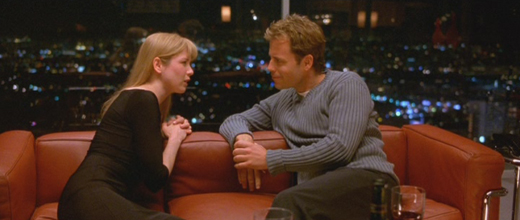nurse betty
Neil LaBute

Neil LaBute’s Nurse Betty ignores the wisdom of the old song and messes with Mr. In-Between. This may cost it an audience. Partaking of both the standard narrative and the frankly surreal, it plays out along the line between the improbable and the impossible. Movies have a lock on this territory and ought to spend more time in it. Although unlikely, the adventure of Betty Sizemore never needs a magic wand to make sense. That’s why I loved it.
At least one review – I can’t remember which – faulted Nurse Betty for failing to establish plot points. When the heroine arrives in California, for example, she quickly finds a job in a hospital pharmacy, even though she was only a waitress back in Kansas. The job falls into her lap – all over her new uniform, actually - when she successfully performs a trauma procedure that she has learned from watching her favorite soap opera. From the critical standpoint of bourgeois realism, this development is risible; why, it’s no development at all. But Nurse Betty is not about how Betty’s dreams come true. It's not about how anything. Her dreams just come true.
Nurse Betty offers many of the pleasures of the soap opera to viewers for whom soap operas are not an option. It simply assumes soap opera culture, and avoids the satirical attitude that gets a film like Pleasantville going. Thinking about Nurse Betty later – but certainly not watching it – calls to mind Tune In Tomorrow, based on Mario Vargas-Llosa’s magic-realist novel Aunt Julia and the Scriptwriter. There we find an arch and ironic take on soap opera. Nurse Betty dares to be deadpan. A darker film in every way than Tune In Tomorrow, whose high jinks keep anything from being seriously at stake, Nurse Betty integrates the romantic and the sensational strands that remain distinct in the earlier film. Although very much a movie about the movies, about make-believe, it erases the distance required for an audience’s perspective. In fact, it hijacks the audience: from the moment when a drug deal gets out of hand, the movie runs off with your attention as briskly as Betty runs off with her husband’s car, and I was no more inclined to look under its hood than is Betty to inspect its trunk. I can’t think when I’ve ever put myself so completely in a director’s hands.
Insofar as Mr LaBute induced my surrender, he did so with a combination of Aristotelian pity and terror and Renée Zellweger’s squinting-sweet smile. (Like Frances McDormand in Fargo, Ms Zellweger commands an irresistible ingenuousness.) The other members of the cast do very fine and enjoyable work, but to talk about their performances is to talk about Betty’s adventure – a distraction as well as a spoiler. I want to stop where the action begins. It is the night of Betty’s birthday, and we find her tucked in front of the television watching an episode of her favorite show. (Her neighbor taped it for her while she was at work.) In the next room, Betty’s loutish husband finds himself in the awkward position of trying to sell drugs to the people from whom he stole them. The pacing of his grisly demise demonstrates the adaptability of the new shape that Quentin Tarantino has given such scenes. Violence still involves assault and battery, not to mention blood, but its essential characteristic is unruliness. Even though you know more or less how things will work out, not knowing how long it will take drives you crazy. Betty, unobserved, sees but cannot believe what she sees. Returning the gaze of her onscreen heartthrob, she snaps, deciding that it’s she he’s longing for. After her husband’s body has been carted off in an ambulance, Betty writes him a sweet note announcing that she’s leaving him for Southern California, but the audience, swept away in pity and terror, has already gone before she even steps into his car. I just hoped that we’d all get there alive – Betty, the story, and me.
We all lived. Betty wins a part on her beloved soap, shows up in 63 episodes, and then applies her earnings toward nursing school. And a trip to Europe - by herself. “This isn’t the Forties,” she is advised near the end, and for all its wish-fulfillment, Nurse Betty honors that principle. Its happy ending would not have been considered happy sixty years ago. Nevertheless it’s as unashamed a happy ending as I’ve seen lately, with the camera pulling high up over an Italian fountain into which the heroine has just tossed a carefree handful of coins. (October 2000)
Copyright (c) 2009 Pourover Press